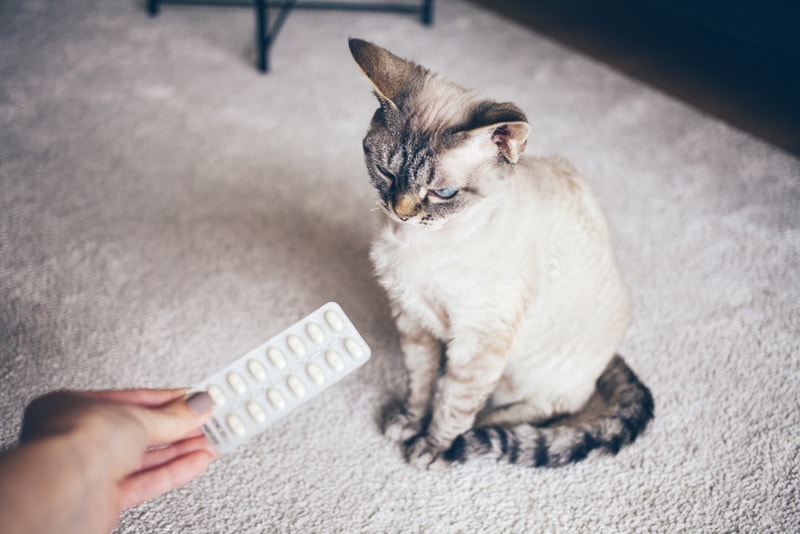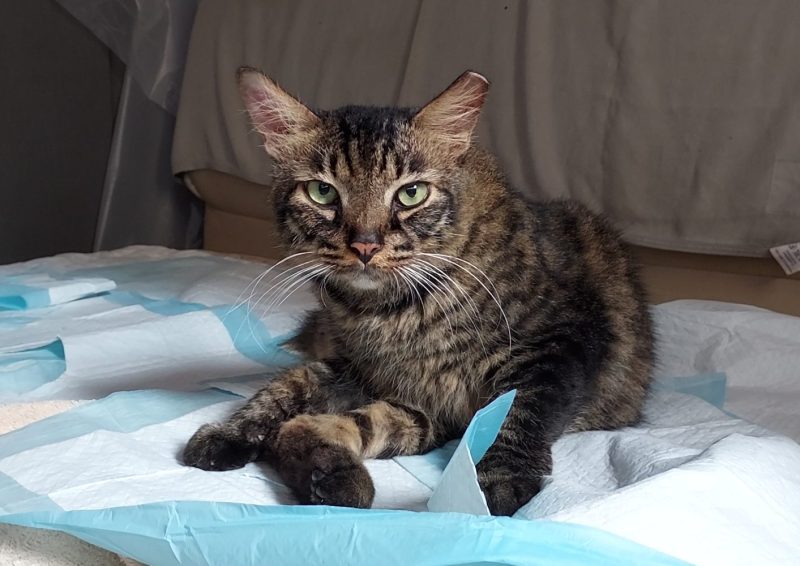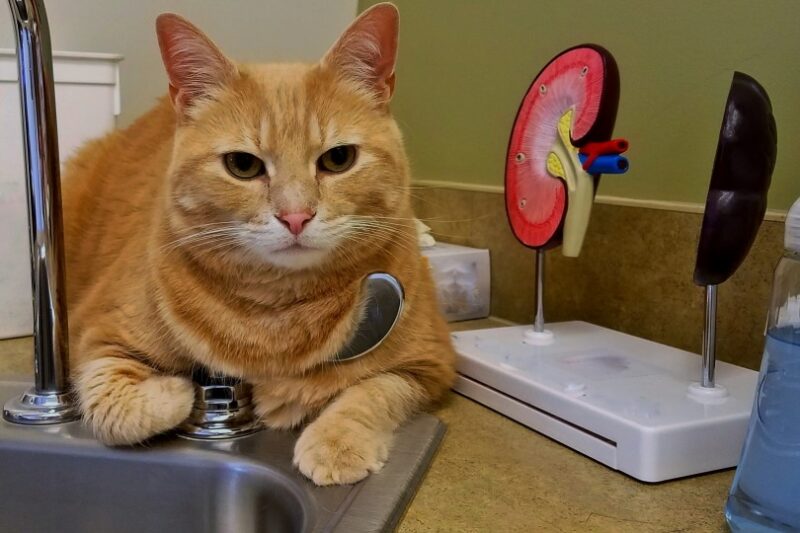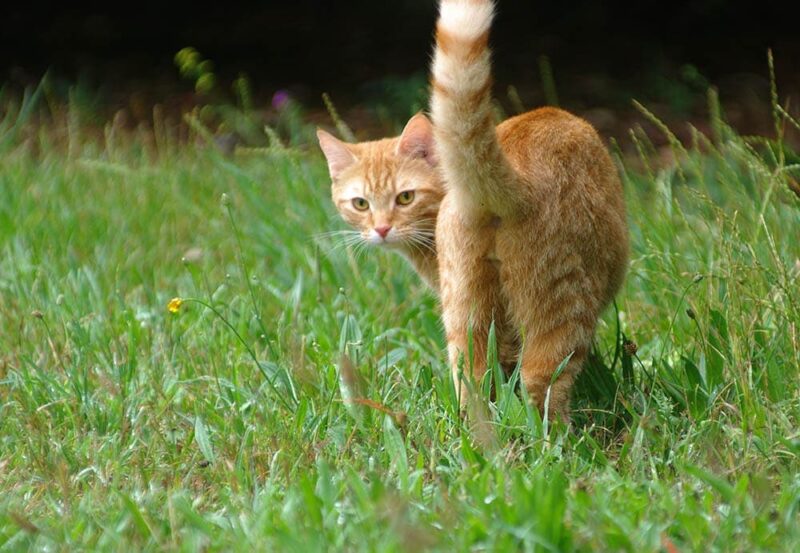In this article
Cats that have not received preventative treatment commonly contract worms, and although seeing the parasites in your cat’s vomit or stool is unpleasant and concerning, they are typically easy to treat. If you have a dog that recently had worms and have leftover dewormer medication, it’s natural to wonder if you can use it for your cat, too.
Some dewormers are safe to give to cats and dogs, but their dosages will differ. However, most dog dewormers aren’t suitable for cats, and vice versa. For that reason, it is recommended never to give dog dewormers to cats. Before giving your cat a dewormer, chat with a vet first.
Your cat should receive the dewormer best suited to their age, weight, and health condition. The medication should be given to your cat according to a vet’s instructions, which will differ from one pet to the other. Therefore, dewormers shouldn’t be shared between pets.
How Did My Cat Get Worms?
If your cat has worms, they’re not the exception since most cats contract worms at some point throughout their lives. Many kittens have worms because they are most vulnerable to parasites at such a young age. They can be born with them or get them from their mother’s milk.
Adult cats can also contract worms by coming in contact with the parasite’s eggs when walking through a contaminated area, sharing a litter box with an infected cat, touching or ingesting infected feces, or hunting and eating infected rodents. If a cat has walked through an infected area and the eggs or fecal particles get on their coat or paws, they can ingest them when they lick and groom themselves.
Although some worms are species-specific, others can infect your cats and dogs. Your cat can become infected by coming into contact with your dog’s poop as well as their fleas. If a flea from a dog jumps on your cat, hides in their coat, and gets ingested while grooming, they can develop a tapeworm infestation.

Are Worms Dangerous to Cats?
Several types of worms can infect your cat. Some cats may not show signs of having worms, while most will become sick. However, some species are life-threatening to cats. The severity of the worm infestation, as well as the health of a cat, can play a role in how sick they will become.
Intestinal worms are most dangerous to kittens because they can cause developmental issues, anemia, and intestinal obstructions, depending on the type of worms they have. Some worms, such as heartworms, threaten cats of all ages because they can cause damage to their heart and lungs.
Below are the types of worms and how they can affect your cat:
- Roundworms: Can cause coughing, which can turn into pneumonia, vomiting, diarrhea, gas, an enlarged abdomen, weight loss, intestinal obstruction, and stunted growth.
- Hookworms: May cause anemia, eczema, skin lesions, coughing, diarrhea with blood, weight loss, and poor appetite.
- Whipworms: Can cause diarrhea with blood, weight loss, anemia, and dehydration.
- Tapeworms: Can cause stunted growth, intestinal blockage, and digestive upset.
- Lungworms: Can cause coughing, which can become pneumonia and lead to difficulty breathing.
- Heartworms: Can cause coughing, rapid breathing, weight loss, vomiting, lethargy, seizures, and sudden death.

The Common Signs Among The Various Types of Worms
- The presence of worms: Sometimes, you can see the worms or parts of the worms in your cat’s stool or vomit. You may also notice worms around their anus area.
- A dull coat: Cats infested with worms often experience a change in their coat, where their once soft, silky, and shiny coat changes into a dull, dehydrated coat.
- Pale gums: Anemia can cause your cat’s gums to become pale in color, whereas a healthy cat’s gums will be pink.
- Digestive upset: Cats with worms often vomit and have diarrhea, which can have blood in it.
- Weight loss: Although your cat might be eating more, they may still lose weight.
If you notice any of these signs in your cat, it’s essential to take them to the vet for an examination. The treatment is often straightforward, and the prognosis is typically good when treated early. However, if your cat doesn’t receive the care they need, they will suffer greatly, and it can even be fatal.
If you need to speak with a vet but can't get to one, head over to PangoVet. It's an online service where you can talk to a vet online and get the advice you need for your pet — all at an affordable price!

Can I Get Worms from My Cat?
If your cat has worms, you or other members of your household may have contracted worms, too. The most common way humans get worms from their cats is by walking in or touching contaminated soil. Cats often poop outside in the soil and sandboxes. If your child plays in their sandbox or you spend time gardening or walking around barefoot, you’re at risk of contracting worms.
The larvae in your cat’s poop can survive for a very long time, and the more an infected cat poops in your environment, the higher your risk of contracting worms. If you’ve dewormed your cat, you’re still at risk of contracting worms from another cat that uses your garden or sandbox as a toilet. Remember always to wash your hands and feet when gardening or walking barefoot outside.
How To Kill & Prevent Worms in Cats
The best way to protect your cat and yourself from contracting worms is to get them dewormed at an early age and repeat the treatment as frequently as the veterinarian advises. Your kitten can receive the deworming treatment from around 6 to 8 weeks of age and will likely need to be dewormed at least twice.
As your kitten gets older, they won’t need to be dewormed as frequently, but we recommend that you deworm your cat once every 1–3 months, especially if you allow them to roam outdoors or spend time with other cats and pets. Indoor cats without much exposure to the outdoors can safely be dewormed once every 3 months.
You can also lower your cat’s risk of contracting worms by starting them on flea and tick treatment, regularly cleaning and sanitizing their litter box, frequently changing out their old litter for new litter, and picking up the poop in the yard and sandbox with a shovel and discarding it properly.
Conclusion
Dog dewormers aren’t safe for cats because the dosage requirements differ. A cat is given a dewormer suitable for their age, weight, and health condition. Worms can be passed through the feces or fleas of one infected cat to another and from an infected dog. Worms can make a cat very sick, but with the correct treatment, they usually make a full recovery.
To prevent your cat from getting sick from worms, make sure to deworm them frequently. Outdoor cats should be dewormed around once a month, and indoor cats should be dewormed once every 3 months.
Featured Image Credit: Veera, Shutterstock





















